Content Sections
Rob Verkerk PhD, founder, scientific and executive director, ANH-Intl
A week is a long time in the midst of an unprecedented global social, economic and health emergency.
Many of us are still aghast by how quickly governments all around the world have decided to implement incredibly life-changing, draconian measures in an effort to stem transmission of the new coronavirus, SARS-cov-2, responsible for the Covid-19 pandemic.
While global and national economies will shrink dramatically, the biggest impacts caused by the measures will inevitably be on those who are not insulated financially. Capital Economics has predicted that the British economy alone could shrink by 15% in the next 3 months and we are moving swiftly into a deep global economic recession that will last at least 2 years.
-
Find related articles, information and videos in our Covid Zone
In some European countries like Italy, France and Germany, the police and even military are being deployed to help enforce lockdowns and curfews and presumably be prepared for civil disobedience and possible unrest.
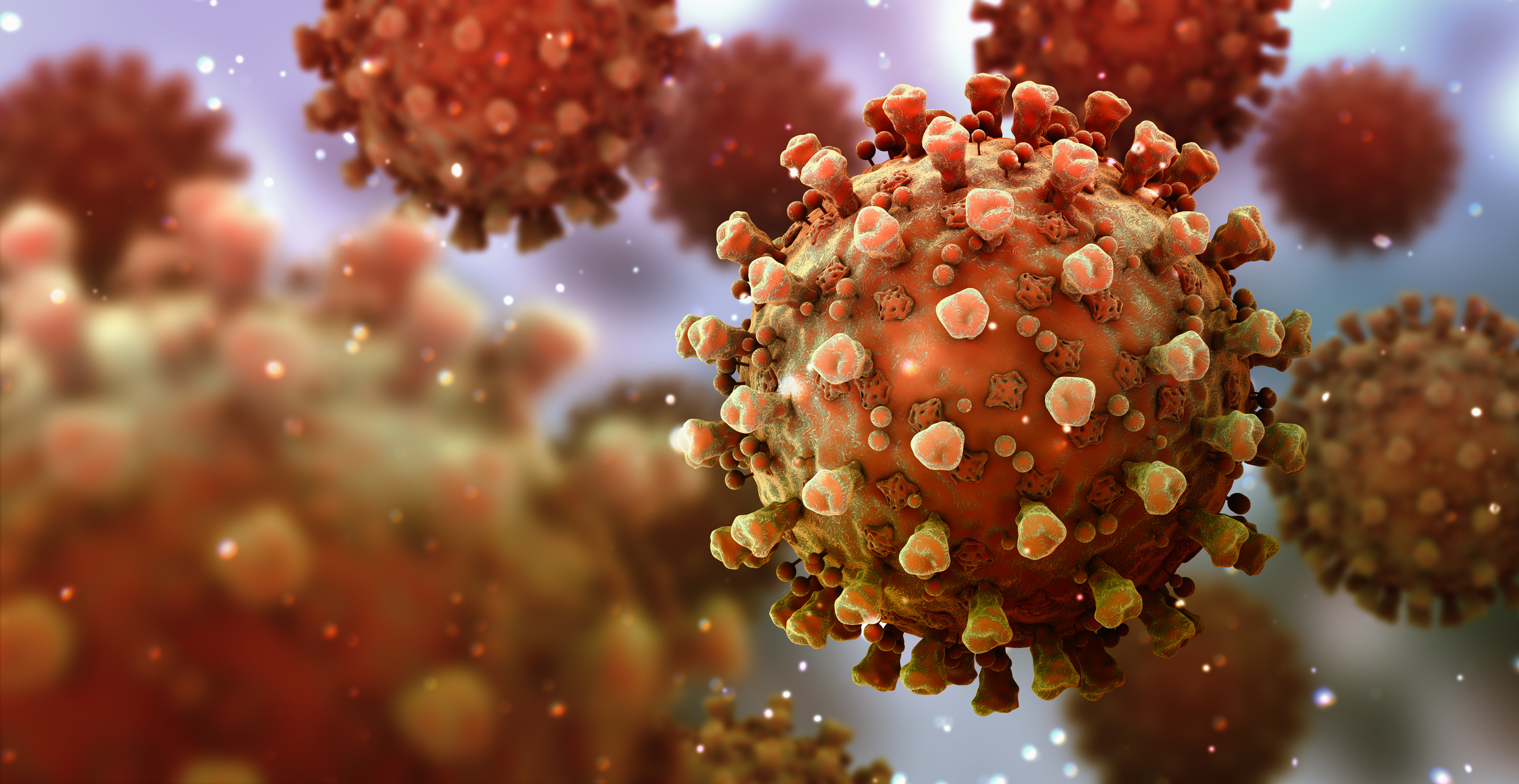
The questions so many are asking go something like this: Are these kinds of heavy-handed measures justified? And if so, on what basis?
We suggest there are six important assumptions that should be satisfied in order that democratically-elected governments be given powers to enforce these measures on their populations:
- Predictable disastrous outcome assuming business as usual. You have reliably predicted that, assuming no changes to civil behaviour, there is a moderate to high chance that COVID-19 related fatalities and illness would exceed anything most societies have been accustomed to dealing with from existing lower respiratory diseases, such as pneumonia and tuberculosis. These presently account for the third most common cause of death globally. The fatality rate from lower respiratory conditions drops to sixth position in upper-middle income countries largely because these don’t suffer significant problems from tuberculosis
- Business as usual will collapse the healthcare system. You assume this additional burden will overrun a given nation’s capacity, either in hospitals or in the community, to deliver respiratory care to infected patients
- Countries can accurately ‘test, test, test’. You assume that testing methods used to determine persons who are infected or those who have developed immunity (specific antibodies) are delivered equitably to all those who need them and are accurate
- Compliant citizens. You assume the package of intensive measures to reduce social contact as a means of stopping or slowing transmission will work and be complied with by the public as long as they are required
- The individual can’t affect the course of disease if infected. You assume there's nothing an individual can do can reduce the severity of the disease if he or she becomes infected
- All options involving less draconian measures are exhausted. You regard the threat as one so great that even in the absence of robust information about susceptibility, transmission, infection rates and health impacts, or about the risks and benefits of a variety of alternate packages of other measures, you are prepared to sideline, until further notice, citizens’ civil liberties and rights to free movement, education, employment, recreation, entertainment and social interaction.
From the available data and information in the public domain, it would seem that there is insufficient evidence or data to satisfy most if not all of these assumptions, at least fully. It’s as if the new coronavirus has given governments the chance to trial the implementation of the kind of joined up international health emergency action that was contemplated when the World Health Organization (WHO) considered the ‘Disease X’ scenario.
How big a threat is Covid-19, relatively speaking?
Breaking this down a little, let’s look at the comparative risks as they stand now, days after draconian measures have been enacted by multiple governments around the world. The current challenge to healthcare systems from the influx of people with severe respiratory illness is not (yet) significant – it is the prospect of disease rates escalating, as shown in some of the computer simulations, that is driving the radical public health policy. These potential future scenarios have been central to the modelling studies, including the most recent one applied to the UK and USA carried out by Prof Neil Ferguson’s group at Imperial College London, the MRC Centre for Global Infectious Disease Analysis (see the latest report on Impact of non-pharmaceutical interventions (NPIs) to reduce COVID-19 mortality and healthcare demand [16 March 2020]).
Covid-19 is in effect a new form of viral pneumonia with relatively low lethality, as compared with the SARS and MERS outbreaks of 2003 and 2012 respectively. As of today, the burden from the new coronavirus, SARS-cov-2, is small by comparison with that from all causes of pneumonia, including bacterial (e.g. pneumococcal) and viral forms (e.g. respiratory syncytial virus, RSV).
The maps from Our World in Data below compare the annual death rates around the world from pneumonia, with those from Covid-19 as of two days ago. If you take the fatality rate as 16 per 100,000 (0.016%) as a typical figure for pneumonia-related deaths in northern hemisphere, industrialised countries, the current death rate of one-in-a-million (0.0001%) from Covid-19 would have to escalate 160-fold by the end of the year for it to be comparable with pneumonia deaths. You won’t need to be told that these pneumonia are rarely the subject of mass media attention, let alone being the basis for the draconian public health measures that threaten livelihoods and economies.
Comparing the Covid-19 situation the world has faced over the last two and a half months, that has given rise to around 8,000 confirmed cases and less than 800 deaths (data source: WHO, it would have to kill over 3,000 times more people than it has so far by the end of the year to equalise with the current 2.6 million that die each year (data source: Global Health Exchange) from lower respiratory tract infections.
These data comparisons serve to remind us that what we’re being asked to engage with has little to do with the current burden of the disease. It’s rather more about a possible eventuality that’s based on uncertain data, multiple assumptions that may or may not be valid, and a series of computer models.
A.
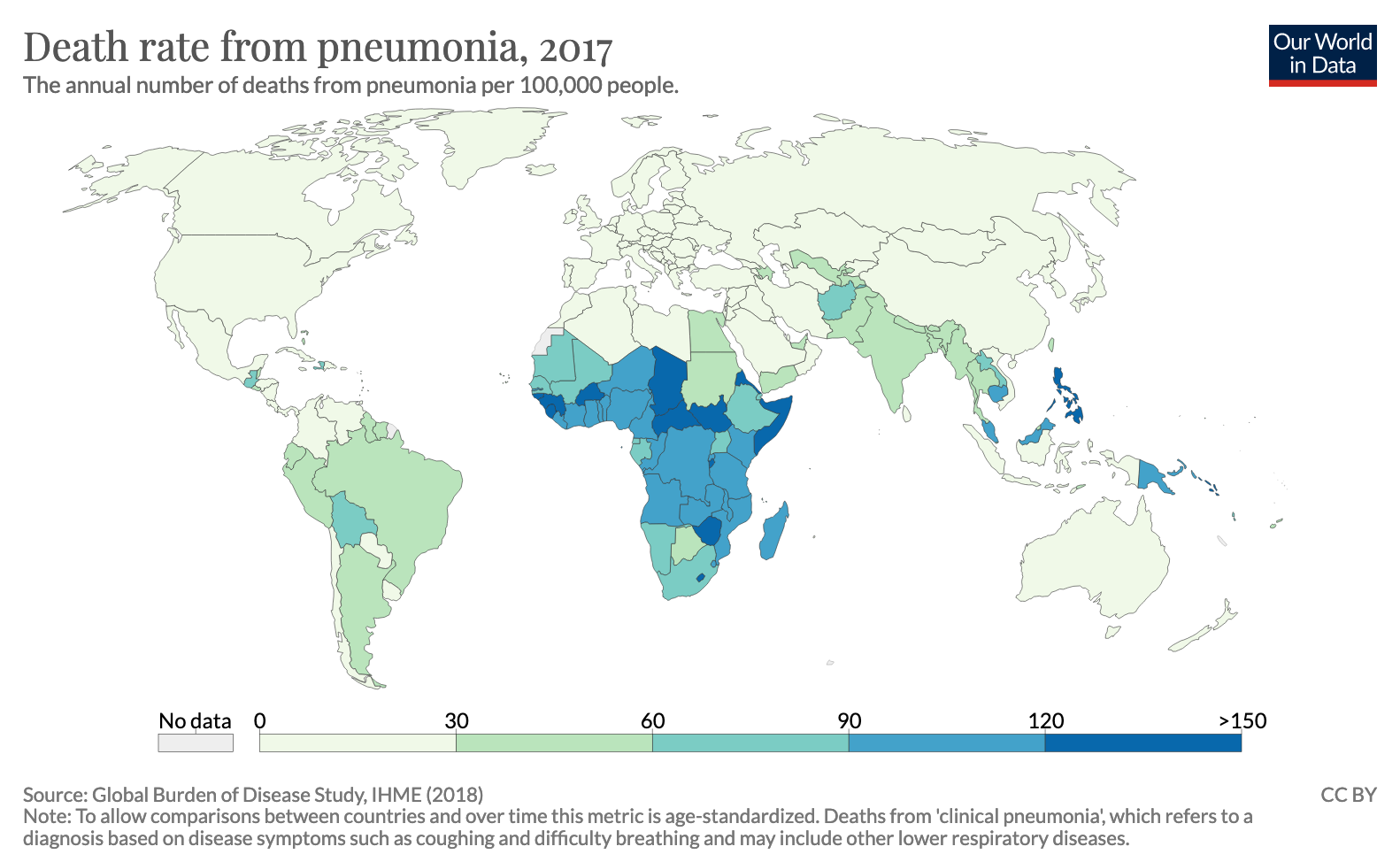
B.
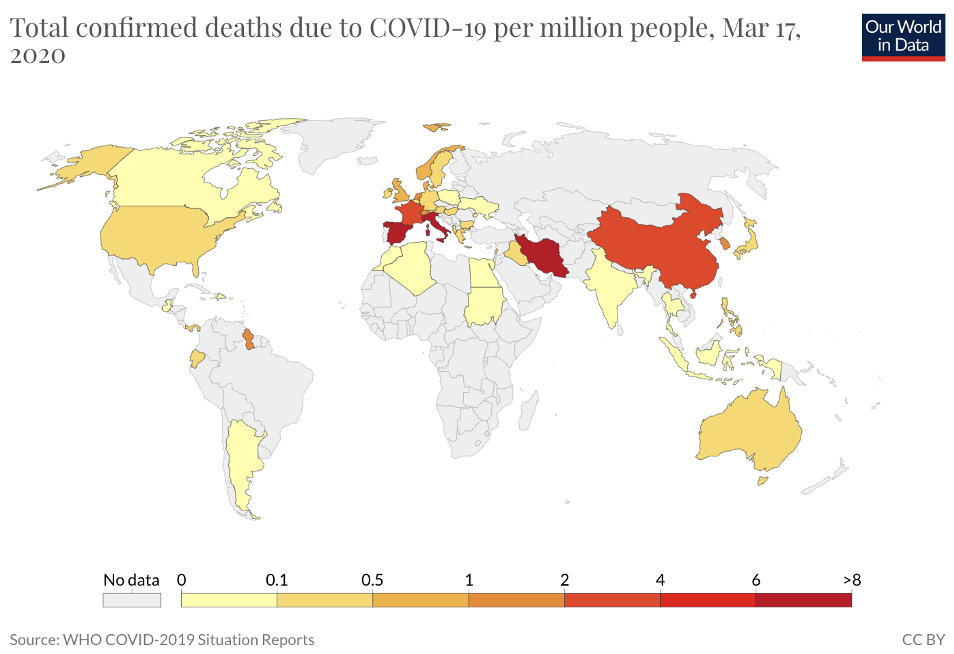
Comparison of death rate from pneumonia (A) and confirmed deaths due to COVID-19 (B) from Our World in Data.
From free society to police state?
The Italian, French and German experiences show us that it’s not easy to get people to enact the social distancing and isolation policies governments are asking for. Using people’s inborn fear (which is in itself a very useful survival emotion) as a ‘weapon’ to encourage or force compliance seems to be part of the modus operandi of governments and health authorities.
The computer models show that all the social and economic sacrifices we’re being asked to endure are worthwhile based on widespread public adherence. Time will tell – and of course it’s an opportunity to convert previously free societies to ones that function more like police states, at least for a time. And that time, we are also being told, cannot be disclosed because we are at the mercy of this perilous disease which will itself manifest as a net consequence of our and the virus’ behaviours.

Immune censorship?
I shared a platform earlier today with a leading UK GP talking to the workforce of a London business that’s deeply concerned about the impacts of the coronavirus on its staff with a view to getting independent advice. The doctor had spent most of the day talking with the media on the issue, sometimes alongside other experts. One of the things he said struck him over and over again was the reticence so many of these experts had in considering the importance of the immune system.
Herein lies, in our view, the biggest information gap coming from governments and health authorities. They are largely mute on the subject. It seems we’re meant to sit tight, distanced and isolated, until vaccines or antiviral drugs are available. But whether those experts like it or not, if we become infected, our immune response is critical to the outcome, whether that means being completely asymptomatic (we know this happens but are uncertain about its frequency), having mild to moderate symptoms of disease (the vast majority of people), or suffering severe respiratory disease (a small minority who are vulnerable owing to their older age or underlying conditions).
In the cases where the disease is asymptomatic, mild or moderate, the immune system has delivered the goods and been wholly responsible for this outcome. If we take the vulnerable group to represent 10% of those infected, it goes without saying that the immune system has successfully combatted disease without causing severe symptoms, collateral damage to the lungs, or even death, in 90% of cases of infection.Try finding a licensed pharmaceutical with that level of efficacy!
Citizen empowerment is the answer
With so many untested assumptions and so much uncertainty in the data and the human response to the social distancing measures with which we’re being asked to engage, it’s critical for us all to have a way forward.
We passionately believe the way forward is to ensure we are not disempowered by the top-down diktats from our governments. More than that, we need to become more empowered and following is a list of some of the key things we think might be helpful:
- Comply to try. We suggest we all do what we can to follow government guidelines, including on hand washing and social distancing, for at least 30 days so that the impact of the social distancing measures can be assessed. If we don’t comply, they could drag on longer.
- Normalise your life. Try to keep as many parts of your life running as normal, even if you’re forced to spend more time at home. Many of us can do a lot of work as well as engage socially online, bearing in mind social distancing
- Don’t panic buy. You will simply upset supply chains and make it more difficult to get the supplies you and others need at a later date
- Get outdoors. Get as much time outside as you can – trees and the great outdoors don’t carry the coronavirus, people do
- Hands off. Change the way you use your hands so you avoid direct physical contact not only with others (other than those you know are not infected because they’ve been around you and not others for 14 days or more) but with your mouth, nose and eyes. You can play games with friends and family and incur credit points for not being spotted touching these parts of our bodies barehanded!
- Sleep easy. Get plenty of good quality sleep to help your immune system be primed for the days ahead. That means avoiding blue light from screens or reading news reports within an hour of going to bed and sleeping in complete darkness (see our 3 health hack videos on sleep: video 1, video 2 and video 3)
- Eat whole, natural, unprocessed or minimally processed food. Don’t live off canned and processed foods. Eat a fresh wholefood diet based on the ANH Food4Health guide
- Get your sunshine vitamin. If you live in the northern hemisphere, the sun’s too low this time of year to allow your skin to produce the vitamin D your immune system needs to function properly. See dosing and information in last week’s article about priming your immune system as nature intended. And most will benefit from taking supplemental magnesium (at least at the recommended daily level of 375 mg/day) which many people are deficient in from their normal diets as it's required for vitamin D activation
- Fill other nutrient gaps. If you think your diet might be deficient in vitamins A, D, E, C, B2, folate, B12, zinc, iron, copper and selenium, supplement with these as they are also critical to the function of both the innate and adaptive sides of your immune system. Then there’s a range of amazing plant nutrients and compounds that have been shown to enhance or modulate immune function, some of which we introduced last week
- Avoid buying into the fearmongering or negativity around Covid-19. While we, as citizens, haven’t been offered the opportunity to exercise choice over our involvement in one of the greatest social, medical and economic experiments most of us are likely to engage in during our lifetimes, it’s relatively easy to avoid infection. Also, for the majority of us, it’s not difficult to maintain our immune systems so they are competent and primed in the event that we become infected. China is already out the other side – it’ll be our turn next.
Adapt - don't fight
Let’s get on as best we can in the knowledge that Nature will take its course and we don’t need to sit there, disempowered and paralysed, because we’re up against this new virus. Viruses are not all bad per se - it's just when they're new to us our immune response might be over-amplified and that can cause us difficulties in the short-term. They're part and parcel of who we are - they're part of our microbiota. We've co-evolved alongside them throughout our million or so years history as a species and the arms race with which we all engage with our microbial foes helps us ultimately to strengthen our defences.
This newly human-adapted coronavirus, like others before it, will likely soon become just one of the many RNA viruses to which we sometimes succumb, probably more so in winter when our vitamin D levels are depleted. One for which the pharmaceutical and vaccine companies have yet to find an answer.
In the meantime, let's apply our focus to ensuring we can minimise our risk of infection and maximise our ability to resist serious disease through the optimal function of our own incredibly sophisticated immune systems that are in the process of learning how best to deal with this new threat. In the knowledge we have done this successfully many times over throughout our ancestral past.
Trying to do that successfully without destroying the social and economic fabric of our societies might ultimately present a greater challenge.
PLEASE SHARE THIS WIDELY AS SOCIAL MEDIA PLATFORMS LIKE FACEBOOK AND TWITTER ARE DOWNGRADING ALL POSTS RELATING TO COVID-19 NOT FROM MAINSTREAM SOURCES. THANK YOU.




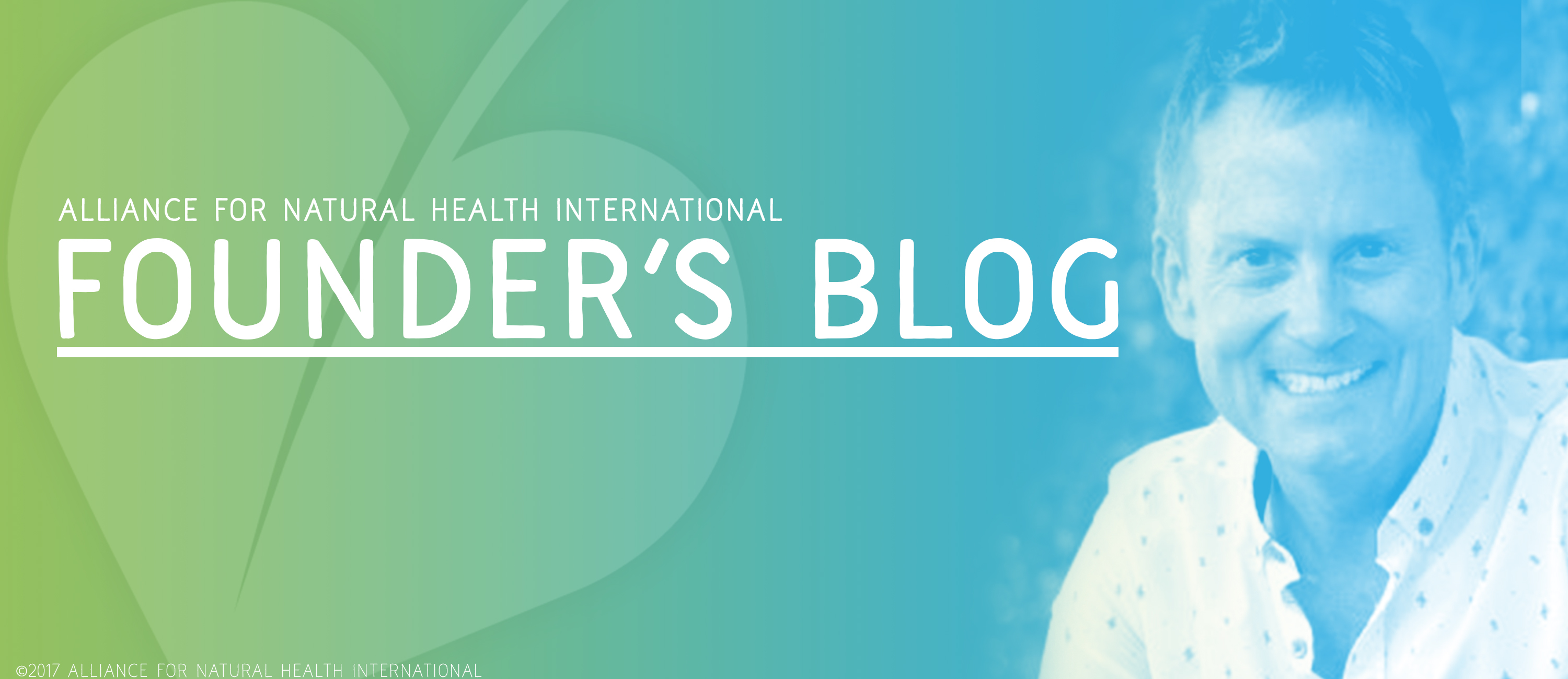
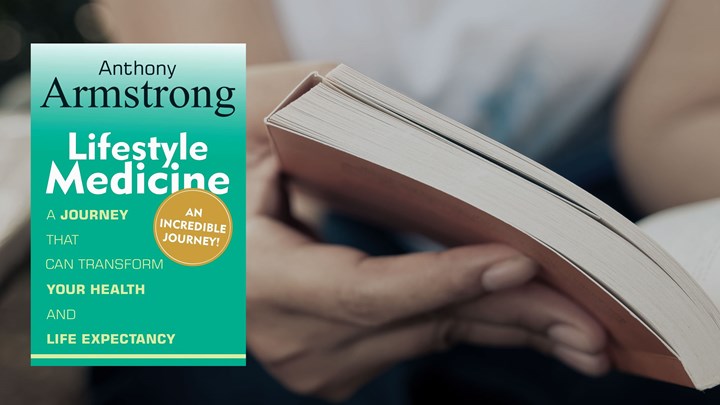
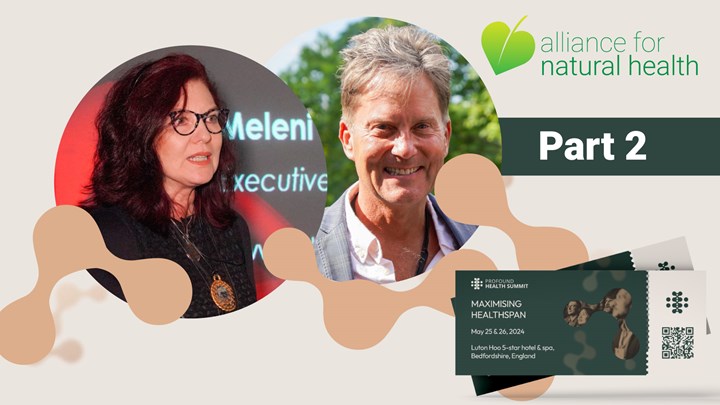

Comments
your voice counts
20 March 2020 at 7:55 am
Thank you for this balanced view
20 March 2020 at 2:05 pm
Your thanks are greatly appreciated.
20 March 2020 at 9:12 am
Rob/ANH I'nal,
Surely, the rise in Auto Immune Disorders and chronic illnesses are largely due to the Big Businesses'involved in our daily living for some years now - whether we want them or not? i.e. GMO, foods incorrectly farmed, chilled transported then finally sold, processed foods with so many additives/chemicals, and other products with chemicals, many not approved, also in the air we breathe and other forms , Antibiotics, multiple chemicals that are foreign to the human body used in automatically prescribed Medications, etc.,. Big Medicines' lack/limited vital training in a number of areas now, recognition of those illnesses and Big Medicines approach to treatments or lack of same, and of those factors and others in the illnesses people now have, and of course the high stress levels that are now a permanent feature of life in developed Countries compounding it all. Read greed caused. This is a very brief list.
Therefore doesn't the disrupted human Auto Immune System in its weakened state, give weight to possit that the rapid spread of this Coronavirus infection, has been aided by the epidemic of Auto Immune Disorders in Society for some years now?
(even Vets are seeing increased numbers of animals with such illnesses)
20 March 2020 at 2:03 pm
Dierdre, you present an interesting hypothesis. You rightly make the point that a weakened or compromised immune system makes it easier for viruses to enter and replicate within susceptible individuals. Assuming equivalent transmission potential, the higher the viral load, the greater the risk of infection. This is obviously something that's difficult to prove clinically under experimental reasons for ethical reasons, but given that 1) autoimmune patients are more susceptible to infections generally, and 2) autoimmune patients tend to be at greater risk of disease from opportunistic infections that don't cause disease in healthy populations [see https://www.sciencedirect.com/science/article/pii/B9780444632692000180], there is support for your hypothesis.
20 March 2020 at 9:39 am
A beacon of common sense in a world gone mad, thank you
20 March 2020 at 2:04 pm
Thanks for the kind comment Alwyne.
20 March 2020 at 9:55 am
Rob,
Thanks so much for this blog. It has saved me having to write a similar one! I Most of my time over the last weeks has been number crunching to get to the actual rates and helping to talk panicked people down off the ceiling. And at the same time witnessing the media hype, focus on the death rate (which we don't know because we have no idea how many mild cases there have been) rather than the 98% who recover, and keep repeating that there is nothing we can do except stay home and panic. The fact that NHS CEO Simon Stevens has asked Facebook and Google to help him combat 'fake news' like advising Vit C and D supplementation (and they have blacked out posts that do) is incredible. The only rationale I can find for this is that his first priority is political - with a history of debt driven privatisations the struggle of the NHS to cope is Christmas come early.
If you scrape the surface there is no joined up thinking. Frontline NHS staff are living in fear because they are working with serious infections without protection themselves, getting sick and taking it home to their families. The Govt is renting beds in private hospitals to the tune of £2.6 billion. If as a country we are supposed to be pulling together why can't those beds be requsitioned by the NHS? None of it makes any logical sense. As in any crisis there is money to be made by the people making the rules.
But the loss of civil liberties in the name of a manufactured crisis is the issue we should be REALLY concerned about.
I am off to share your blog!
20 March 2020 at 1:54 pm
Thanks for your fascinating insights, Carol. Setting up community support for infected patients would be far cheaper and more flexible given that outbreak patterns are likely to be unpredictable geographically. Media-driven hysteria out of concern for the potentially lethal consequences of infection are immobilising people, yet without knowing the population who are asymptomatic, unconfirmed or unknown, everyone's shooting in the dark. But the bigger this denominator, the 'friendlier' the virus looks - and makes it all the more absurd that such drastic action has already been taken by governments. Thanks for sharing.
20 March 2020 at 10:52 am
Wow, at last, some really important, useful information and advice that we all need right now!
I haven't been worried about the virus at all, but horrified at all the fear, hysteria and draconian measures put in place, none of which make any sense to me!
Thanks so much for this - I will share on social media in the hope that others will listen!
XXX
20 March 2020 at 2:07 pm
Many thanks Lisa, just bear I mind social media is blocking a lot of posts linked to COVID-19 if they refer to the immune system, natural products, or views that don't coincide with mainstream authorities.
20 March 2020 at 12:27 pm
Not forgetting that magnesium is also essential for 'activating' vitamin D in the body (especially if we mostly have low levels at the moment). Many of us are deficient, a deficiency can impact one's ability to tolerate 'stress' leading to anxiety and 'stress' in itself increases the need for magnesium in a 'vicious circle' kind of way. A strong immune system is vital!
20 March 2020 at 2:20 pm
You are so right Vanessa - and given a large sector of the population are typically deficient in magnesium from their normal diets (as reflected in the UK's rolling National Diet and Nutrition Survey), it's an important consideration. We have added your suggestion to the point on vitamin D in the blog - many thanks indeed for pointing this out.
20 March 2020 at 6:25 pm
Great article, very appreciated and common sense. Your piece together with yesterday's presentation by Dr Klinghardt from Klinghardt Institute both suggest much deeper agendas than the superficial 'reactivity' many are caught in. But even on the simple level of bolstering immunity naturally there is, as usual, zero advice from mainstream source. This crisis is, in my humble option, inevitable given the profound corporate control of the pharmaceutical giants.
Thank you for 'holding the line' of grounded wisdom.
20 March 2020 at 7:52 pm
Thank you so much Rob, I was particularly looking forward to your update as you always make so much sense! I thought the latest CDC information was interesting https://www.cdc.gov/flu/weekly/index.htm . I know it’s the US, but they theorise 380million “normal” flu cases, with 390,000 hospitalisations and 23,000 deaths. There is no doubt covid19 is very different primarily because it is all happening at once, but I do worry about our future freedom. Thank you.
21 March 2020 at 9:26 am
Rob,
I have been asked by people I have shared your article with to explain this paragraph which is causing some confusion and therefore throwing the rest of your article into doubt.
"Comparing the COVID-19 situation the world has faced over the last two and a half months, that has given rise to around 8,000 confirmed cases and less than 800 deaths (data source: WHO, it would have to kill over 3,000 times more people than it has so far by the end of the year to equalise with the current 2.6 million that die each year (data source: Global Health Exchange from lower respiratory tract infections)."
Seems important to clarify this because the public need to know the reality.
Many thanks
24 March 2020 at 5:23 pm
Hi Melissa - they were asking about the numbers: 8,000 confirmed cases and less than 800 deaths. When and where were there 8,000 cases and less than 800 deaths? Thanks.
21 March 2020 at 12:20 pm
Thanks so much Rob for your sensible articles both on email and in "WDDTY" magazine. A beacon of light in a Big Pharma darkness. I always take C and D in the winter so both are upped at the moment. When I read this media hype I start checking figures and it comes very close to what you printed in the article above. Of course Governments trade on fear of the unknown, so do not like us knowing too much which is why social media cuts the truth out.
Thank you for the great work you do Rob, hope to read much more from you.
22 March 2020 at 9:52 am
Finally a voice of reason. Thank you so much
25 March 2020 at 9:39 am
This is so wonderful and empowering. Thank you. We will pick this up on our website and share widely. Tatiana and Rishab
Your voice counts
We welcome your comments and are very interested in your point of view, but we ask that you keep them relevant to the article, that they be civil and without commercial links. All comments are moderated prior to being published. We reserve the right to edit or not publish comments that we consider abusive or offensive.
There is extra content here from a third party provider. You will be unable to see this content unless you agree to allow Content Cookies. Cookie Preferences